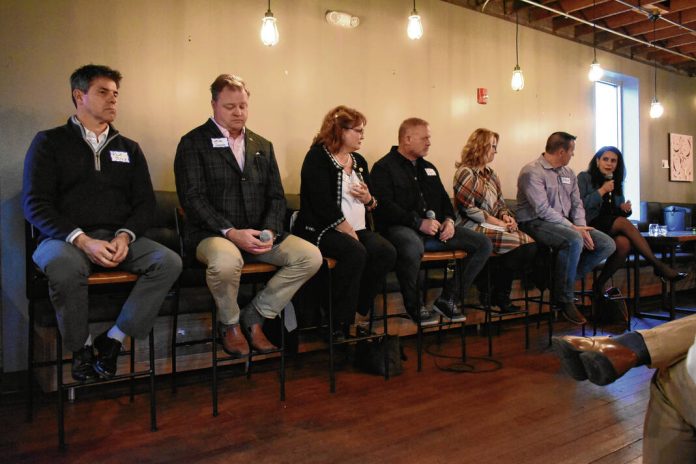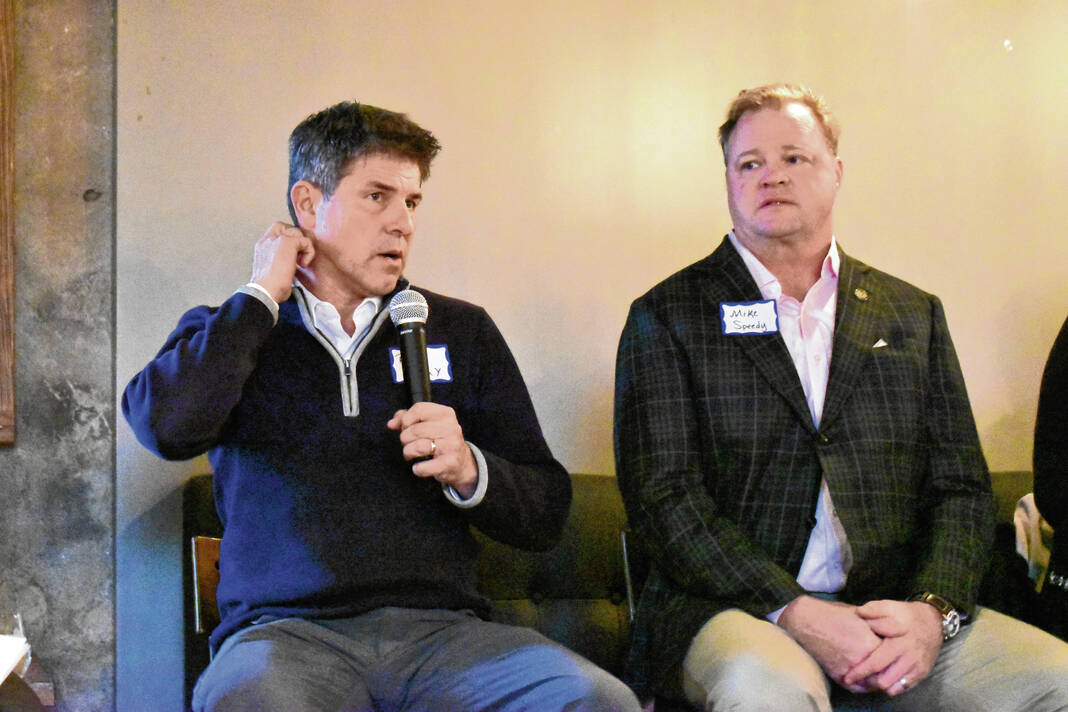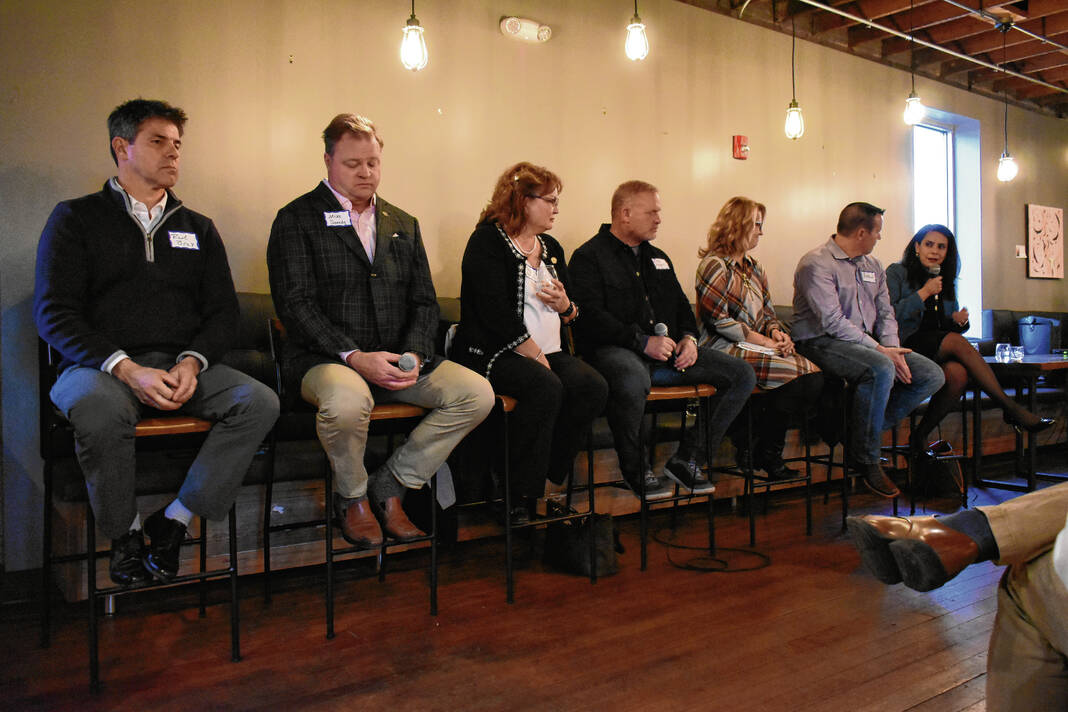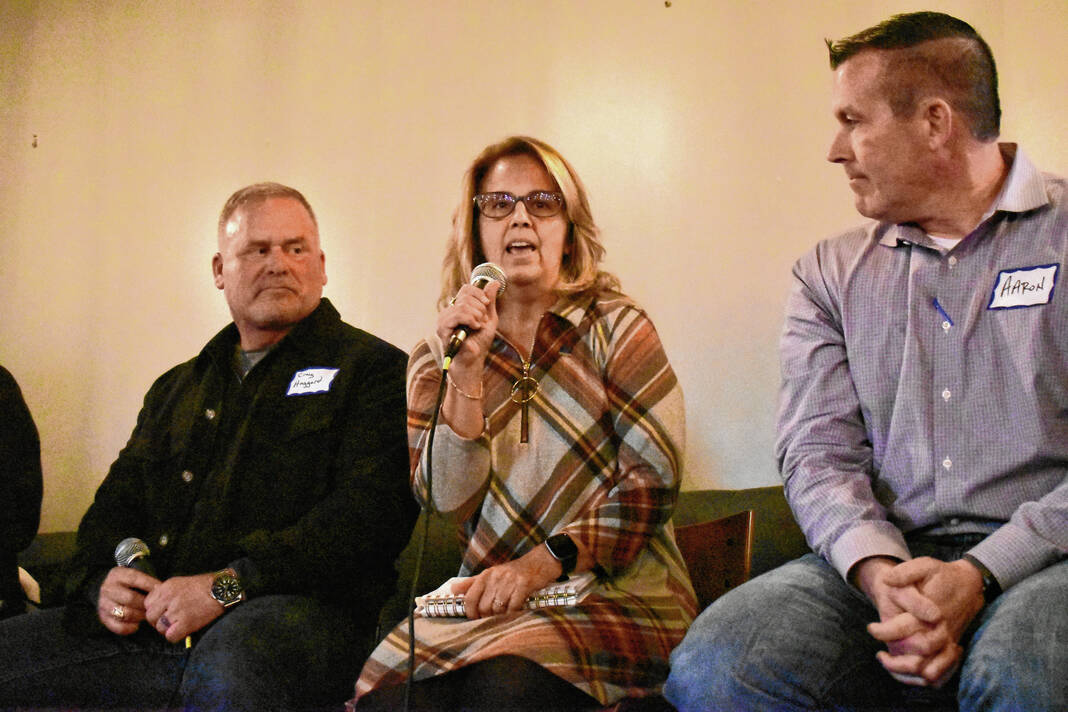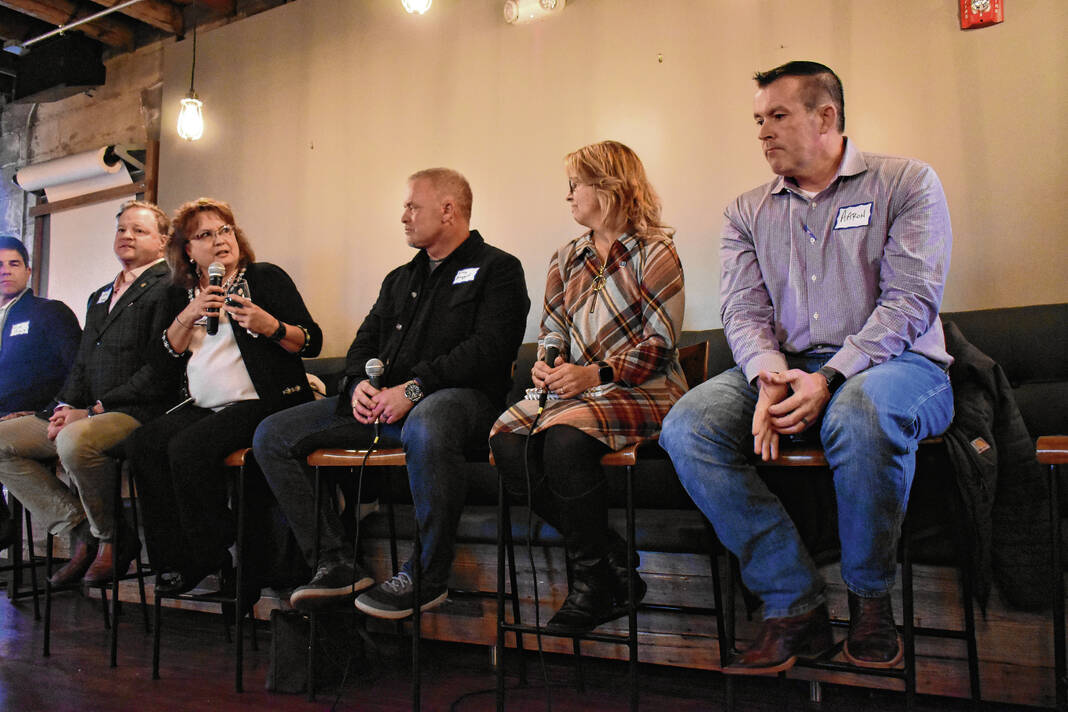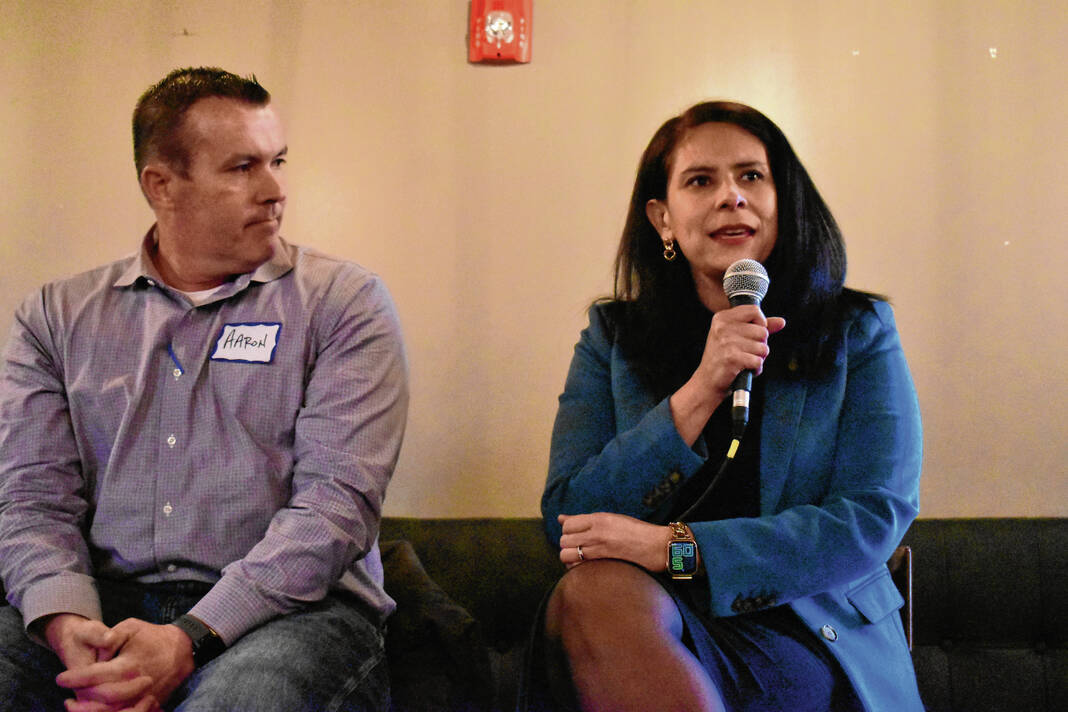Although it’s a shorter legislative session, local state lawmakers say they have a lot of work ahead of them in January.
The upcoming 2024 session of the Indiana General Assembly was the focus of the latest Legislation Matters event hosted by Aspire Johnson County, the county-wide chamber of commerce, Tuesday evening at Taxman Brewing Company in Bargersville. Seven lawmakers representing Johnson County and the southside of Indianapolis discussed the upcoming session, what to expect and legislative priorities.
Before the discussion turned to the session, lawmakers and chamber members took a moment to honor the late Sen. Jack Sandlin, R-Indianapolis. The 72-year-old unexpectedly died on Sept. 20. State Sen. Cyndi Carrasco, R-Indianapolis, was chosen in an Oct. 18 caucus to serve out the remainder of his term.
Aspire had worked with Sandlin on a lot of business and community issues, said Christian Maslowski, president and CEO. He later invited those in attendance to join him in a moment of silence for the late senator.
“Our community lost a kind, honest and dedicated public servant,” Maslowski said. “We will forever honor his service to our community and especially the way he advocated for our men and women in uniform.”
Maslowski also asked attendees to give their thoughts and prayers to State Sen. Greg Walker, R-Columbus, whose wife died from cancer last month. Walker was unable to attend Tuesday evening’s event.
The session
Next year’s legislation session in Indianapolis is a short one. Once it hits January, lawmakers have about three months to get all of their business done before a March 14 statutory deadline to adjourn for the year.
Senate President Pro Tem Rod Bray, R-Martinsville, highlighted some good news about the state before getting into the challenges it faces. Indiana is ranked among the best in the nation for people starting their own businesses, and the state’s tax structure is consistently ranked in the top 10 in the nation, he said.
The state’s infrastructure is also No. 1 in the nation, and Indiana was recently ranked as the sixth best state in the nation for high school computer science training, Bray said.
“All (these) things are really, really positive,” he said.
There are challenges facing the state though, and lawmakers are planning to try to address them in January. These challenges are inflation, housing costs and workforce, Bray said.
Workforce participation rates are being challenged by a lack of daycare and childcare. To address this, lawmakers plan to look at addressing the number of regulations around daycare, he said.
“Over the last several years, we have added regulations to daycare for the idea of having quality and health and safety — all really laudable goals,” Bray said. “But the challenge and the consequence to adding those hoops to jump through means you begin to choke off the supply. … I think we’re seeing a result of that, plus a very low unemployment rate that we’re enjoying right now in the state of Indiana, so we have to take that into account.”
Reading proficiency is another issue legislators plan to look at. There’s a large number of kids who get past third grade without the ability to read at that age and grade level, which is not good and can be challenging for their future growth. Lawmakers want to take a look at whether or not the kids should pass on to fourth grade if they don’t have the reading proficiency needed, Bray said.
Truancy is another issue, that Bray says needs more attention. Across the state, there are about 89 schools where there are one of two chronically truant kids. This is about 25% across the state generally, he said.
“All of which, those numbers are completely unacceptable,” Bray said. “And so we’ll work on that as well as a handful of other things.”
Because it’s a short session during both a gubernatorial and a presidential election year, State Rep. Mike Speedy, R-Indianapolis, says that lawmakers will have “targets on their back” from both candidates and constituents as the session goes on. Despite this, it’s their goal to get it done as quickly as possible so they can avoid as many fires and criticism as possible, he said.
“We really have to be really sharp on what we want to get done, and that comes from leadership but we also have all our own agendas and our own priorities,” Speedy said.
Lawmaker’s bills
Bills planned by State Rep. Craig Haggard, R-Mooresville, have a more national slant, which he attributes to his military background and serving overseas. There are things that Indiana can do as a state that the federal government is not stepping up to do, he said.
“A lot of that has to do with some national security stuff with bad players including the CCP (Chinese Communist Party), North Korea, and some other stuff,” Haggard said.
One bill, for instance, would outlaw the “bad players” from owning any real property in the state of Indiana. It would fine them if they do, and they would have two years to divest their interests, Haggard said.
Similar legislation has been passed in Arkansas and Florida, he said. The bill would also require these parties to report if they give universities a donation of over $50,000, he said.
Haggard also plans to work on legislation addressing human trafficking, he said.
State Rep. Michelle Davis, R-Whiteland, is working on bills about deregulating education and has met with principals and superintendents across the state, along with the Indiana Department of Education, about this. Indiana’s education needs to be meaningful and things need to be done for a purpose, not just to check off as being done, she said.
She’s also working with a group on a bill addressing homelessness. The language is still being worked on, and Davis told the group it may be a few years before the language is figured out.
Other issues she plans to address are school safety, along with the insurance issue that is preventing Johnson County Park’s Gatling Gauntlet from operating. The amenity, which opened last year, has been indefinitely closed after the county’s insurance company said they couldn’t insure it anymore, saying some of the obstacles were too dangerous. Officials told the Daily Journal last month they were hoping to work with state legislators to change existing laws to allow obstacle courses such as the Gatling Gauntlet to be looked at like other activities with increased risk, such as horseback riding and equestrian events.
Lawmakers are looking at having language similar to what Ohio, which has a similar amenity, has on the books, Davis said.
“I’ve been working on some language so that hopefully we can get that insured again, and we can get that up and running here in Johnson County because it’s an amazing course if you’re into that type of stuff,” she said.
Other legislation could also tweak aspects of a bill passed last year that seeks to expand work-based learning in Indiana high schools, like through apprenticeships and internships. For example, lawmakers need to address issues surrounding the liability of having a 16, 17, or 18-year-old working for the companies who would have them, Davis said.
Tweaks on what a high school diploma looks like are also on the horizon as lawmakers plan to work with the IDOE on making diplomas more flexible. If a student is working in the workforce for four to five hours a day, they’re not going to be in school to get the three to four other credits they need to graduate, Davis said.
“The department of education of the state of Indiana [is] looking at maybe a Core 20 diploma where you need 20 credit hours of core classes and then the rest is the work-based learning experience. So you’ll see some legislation on that,” she said.
One of Speedy’s legislative priorities is widening Interstate 70 to three lanes from the Illinois to Ohio borders.
“We are the Crossroads of America. We are the central nervous system of our economy in the Midwest, if not the country,” he said. “It’s important that we now finish that task so we can say that we’ve continued to strengthen our economy and our infrastructure. That’s something that Speaker [Todd] Houston has as highlighted.”
Lawmakers also plan to make a statement against anti-semitism in light of the conflict between Israel and Hamas. They want to protect students and want everyone to feel safe on college campuses, Speedy said.
“It’s important that we make, as a caucus, as a legislature, as the highest body in our state, that we are serious about pushing back against anti-semitism wherever it [rears] its ugly head, and that is extremely ugly. It often happens in colleges first,” he said. “We believe in free speech, but … it can go further than that and result in violence. We don’t want this country to be Europe in the 1930s, and it starts with people, with our caucuses, with our legislature taking a stand on that area.”
CORRECTION: Nov. 30, 2023, at 9:50 a.m.
A previous version of this story contained an incorrect statistic about truancy in Indiana schools. Because of a typo, the previous version said there are about 89 schools where there are one or two chronically truant kids.
However, it is actually one of two chronically truant kids, not one or two.


